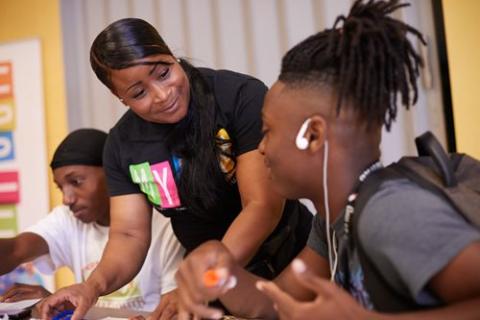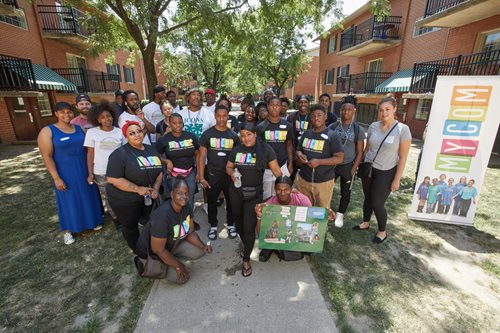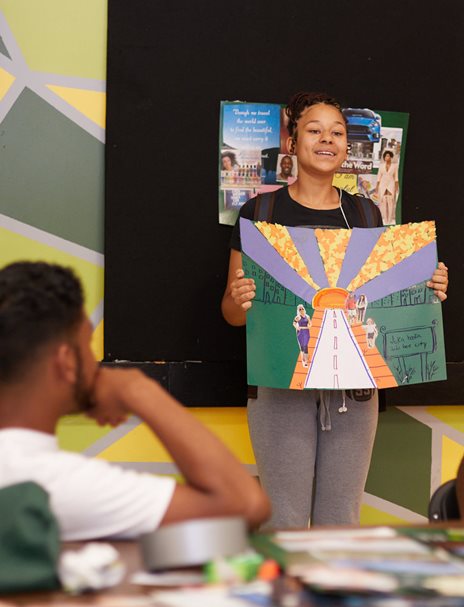Image

When Audrey Stubbs was a child, she couldn’t wait to turn 12, because that was the age when she would be allowed to start babysitting. At that young age, she sensed what she knows today: “Working with people, with youth in particular, is my pillar—where I get my strength from,” she says.
She credits this early sense of direction and inspiration to her grandmother, a longtime Wade Park, Cleveland, resident with whom she spent many summers while her mother was working.
“My grandmother's motto was, ‘I’ve never met a stranger.’ Seeing how she walked down the street and spoke to everybody; that really resonated with me,” Stubbs recalls. “It shaped who I am today.”
Stubbs has followed her “calling” ever since—focusing on children and youth in need in both her work and community life.
Early roots
The former began with the U.S. Department of Labor’s Job Corps, which offers free education and vocational training to youth ages 16 to 24. When she was just 25, Stubbs traveled around the country, interviewing applicants to discuss the direction in which they hoped to take their lives, the obstacles they faced and whether Job Corps was a good option for them.That led to stints running a home daycare program for children of young working moms, serving as family case manager for the area’s Council for Economic Opportunities and helping a charter school with community outreach. It was during the years at the school that she began a youth initiative to prevent violence.
“There was a lot of gang activity and the kids at the school were being harassed,” Stubbs explains. “So, I decided to help them take a stand.”
Helping youths find their way
 The initiative has grown today into MyCom (My Commitment, My Community), a network committed to facilitating positive futures for local youths by connecting them with community-based programs and services. It exposes kids, from kindergarten to high school graduation, to a variety of activities and experiences that allow them to explore new interests and learn new skills, while interacting with caring and committed adults—teachers, mentors, employers and others—who offer guidance and encouragement.
The initiative has grown today into MyCom (My Commitment, My Community), a network committed to facilitating positive futures for local youths by connecting them with community-based programs and services. It exposes kids, from kindergarten to high school graduation, to a variety of activities and experiences that allow them to explore new interests and learn new skills, while interacting with caring and committed adults—teachers, mentors, employers and others—who offer guidance and encouragement. Meanwhile, Stubbs had become familiar with NeighborWorks member Famicos Foundation. She attended and participated in a number of its community events, and her cousin found a rental home with the nonprofit’s help.
“I remember thinking, ‘I like the work they do. I'm gonna work for them one day.’ I don’t think I really believed that would happen though,” Stubbs laughs.
The admiration was mutual. Famicos noticed her work in the community and four years ago, asked Stubbs to join its team as youth development manager. Soon, Stubbs brought her youth work to the Wade Park neighborhood, her grandmother’s community and a Famicos “territory.”
“I love Wade Park; I love the neighborly feel,” Stubbs explains. “I knew what it meant to my family growing up and I really want to give back now. It’s why I do so much and why I fight so hard—to make a difference there.”
As a result of that spirit, Stubbs has been named a 2018 recipient of NeighborWorks America's Dorothy Richardson Award for Resident Leadership.
'Neighbors need to know neighbors'
Stubbs also initiated “Bridging the Gap,” an initiative designed to bring young adults and senior citizens together in the community.“I realized that neighbors didn't know neighbors, especially these two generations,” she recalls. “So, I decided we have to bridge this gap between them and bring everybody together.”
The centerpiece of the program is an annual event at which residents network and Famicos showcases a variety of local resources. Once neighbors get to know each other, she observes, they look out for each other.
To assure ongoing impact, follow-up activities are planned throughout the year. For example, there’s the “stand-down”—so named because it’s designed to get residents to stop what they are doing and notice the people in their community who are in need. Local businesses donate hygiene items, toiletries, blankets and food, which then are distributed by volunteers to all who come.
 Another program coordinated by Stubbs is Future Leaders of the World (FLOW), a youth group that encourages political, social and economic engagement in the community. Members visit city hall, for example, and sometimes volunteer on local campaigns. On Advocacy Day, they travel to the state capital, Columbus, to talk to state legislators. To help participating youth develop their communication skills, the group puts on a spoken-word competition with a companion book sold on Amazon to raise funds. In their performances and writing, the youth discuss violence in their community, domestic abuse, education, death—everything on their minds.
Another program coordinated by Stubbs is Future Leaders of the World (FLOW), a youth group that encourages political, social and economic engagement in the community. Members visit city hall, for example, and sometimes volunteer on local campaigns. On Advocacy Day, they travel to the state capital, Columbus, to talk to state legislators. To help participating youth develop their communication skills, the group puts on a spoken-word competition with a companion book sold on Amazon to raise funds. In their performances and writing, the youth discuss violence in their community, domestic abuse, education, death—everything on their minds.“The book is like a catalyst, because it allows the kids to get exposure to writing and really look deep to find where their strength lies. Then, when they are with people like state legislators, they're not so timid,” Stubbs explains.
None of these activities would be possible without Stubbs and what she calls her “awesome” network of volunteers and partner organizations that are ready to provide assistance when she calls. Ultimately, though, what is essential to her success, she says, is “being real” and earning trust.
Stubbs recalls one 10-year-old who was basically raised in the county “system” and carries a gun. So did his 14-year-old brother. “That is basically the life they grew up with,” she explains. “Their uncles were in gangs. They kind of mimic what they see. But when this young man sees me, he says ‘Yes ma'am. Thank you ma'am.’ I feed him, he hugs me. Every time.” But it’s different on the street.
“You have to be real with youth to connect with them. You have to listen and then be honest with them. People speak to kids all of the time, but a lot of times they don't feel like they're being heard. I wouldn’t be able to do the things I do, or go the places I have to go, if the kids and their families didn’t know they can trust me.”

